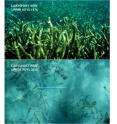New study found ocean acidification may be impacting coral reefs in the Florida keys
In a new study, University of Miami (UM) Rosenstiel School of Marine and Atmospheric Science researchers found that the limestone that forms the foundation of coral reefs along the Florida Reef Tract is dissolving during the fall and winter months on many reefs in the Florida Keys. The research showed that the upper Florida Keys were the most impacted by the annual loss of reef. Each year the oceans absorb CO2 from the atmosphere and become more acidic, a process called ocean acidification. Projections, based largely on laboratory studies, led scientists to predict that ocean pH would not fall low enough to cause reefs to start dissolving until 2050-2060.
For two years, the researchers collected water samples along the 200-kilometer (124-mile) stretch of the Florida Reef Tract north of Biscayne National Park to the Looe Key National Marine Sanctuary. The data provide a snapshot on the health of the reefs, and establish a baseline from which future changes can be judged.
The results showed that reef dissolution is a significant problem on reefs in the upper Keys with the loss of limestone exceeding the amount the corals are able to produce on an annual basis. As a result these reefs are expected to begin wasting away leaving less habitat for commercial and recreationally important fish species. Florida Keys' reefs have an estimated asset value of $7.6 billion.
In the natural scheme of things in the spring and summer months, environmental conditions in the ocean, such as water temperature, light and seagrass growth, are favorable for the growth of coral limestone. While, during the fall and winter, low light and temperature conditions along with the annual decomposition of seagrass, result in a slowing, or small-scale loss of reef growth. However, as atmospheric CO2 is absorbed by seawater, ocean pH declines. The result is that the natural summer growth cycle of coral is no longer large enough to offset the effects of dissolution from ocean acidification.
"We don't have as much time as we previously thought," said Chris Langdon, UM Rosenstiel School professor of marine biology and ecology, and a senior author of the study. "The reefs are beginning to dissolve away." "This is one more reason why we need to get serious about reducing carbon dioxide emission sooner rather than later," said Langdon.
The data for the study were collected in 2009-2010. The researchers suggest that a more recent analysis should be conducted to see how the reefs are faring today. "The worst bleaching years on record in the Florida Keys were 2014-2015, so there's a chance the reefs could be worse now," said Langdon.
Source: University of Miami Rosenstiel School of Marine & Atmospheric Science
Articles on the same topic
- Continental drift created biologically diverse coral reefsFri, 6 May 2016, 15:06:10 UTC
- Reef system with 10,000 km2 found at the Amazon River mouthMon, 2 May 2016, 20:02:12 UTC
- Protecting diversity on coral reefs: DNA may hold the keyWed, 27 Apr 2016, 19:53:45 UTC
- We share a molecular armor with coral reefsTue, 26 Apr 2016, 23:33:11 UTC
- Algae disrupt coral reefs' recyclingMon, 25 Apr 2016, 15:35:27 UTC
- Corals most important for building reefs are now in sharp declineSat, 23 Apr 2016, 20:12:22 UTC
Other sources
- Continental Drift Created Biologically Diverse Coral Reefsfrom Newswise - ScinewsFri, 6 May 2016, 18:30:54 UTC
- Continental drift to thank for coral reef biodiversityfrom UPIFri, 6 May 2016, 16:31:05 UTC
- Continental drift created biologically diverse coral reefsfrom Science DailyFri, 6 May 2016, 15:01:18 UTC
- Continental drift created biologically diverse coral reefsfrom PhysorgFri, 6 May 2016, 9:00:49 UTC
- Scientists discover how one microorganism erodes coral reefsfrom PhysorgWed, 4 May 2016, 16:21:07 UTC
- More acidic seawater eating away at Florida Keys reeffrom CBSNews - ScienceTue, 3 May 2016, 20:00:45 UTC
- More acidic seawater now dissolving bit of Florida Keys reeffrom AP ScienceTue, 3 May 2016, 16:20:51 UTC
- Ocean acidification may be impacting coral reefs in the Florida keysfrom Science DailyMon, 2 May 2016, 19:50:46 UTC
- New study found ocean acidification may be impacting coral reefs in the Florida keysfrom PhysorgMon, 2 May 2016, 19:11:10 UTC
- New Study Found Ocean Acidification May Be Impacting Coral Reefs in the Florida Keysfrom Newswise - ScinewsMon, 2 May 2016, 18:40:58 UTC
- Coral reef at Amazon River's mouth surprises scientistsfrom CBC: Technology & ScienceFri, 29 Apr 2016, 19:40:45 UTC
- Protecting diversity on coral reefs: DNA may hold the keyfrom Science DailyThu, 28 Apr 2016, 3:40:41 UTC
- Protecting diversity on coral reefs: DNA may hold the keyfrom PhysorgWed, 27 Apr 2016, 20:20:51 UTC
- We share molecular armor with coral reefsfrom Science DailyWed, 27 Apr 2016, 13:20:55 UTC
- We share a molecular armor with coral reefsfrom PhysorgTue, 26 Apr 2016, 23:00:50 UTC
- Algae disrupt coral reefs' recyclingfrom Science DailyMon, 25 Apr 2016, 20:00:48 UTC
- Algae disrupt coral reefs' recyclingfrom PhysorgMon, 25 Apr 2016, 15:20:52 UTC
- Corals most important for building reefs are now in sharp declinefrom Science DailySat, 23 Apr 2016, 20:10:39 UTC
- Corals most important for building reefs are now in sharp declinefrom PhysorgFri, 22 Apr 2016, 18:00:46 UTC
- 12 Outstanding Artificial Reefs to Visitfrom Live ScienceThu, 21 Apr 2016, 15:30:55 UTC
